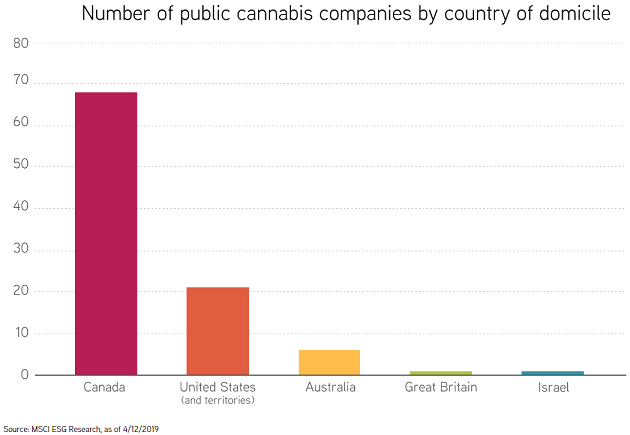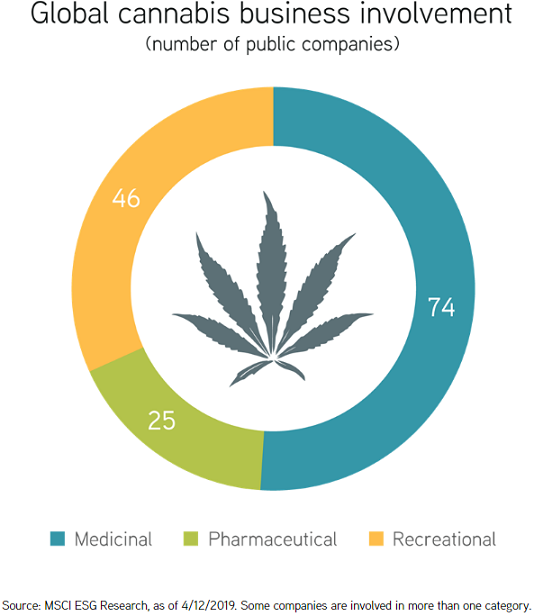
StonebridgeFOCUS: Are There Cannabis Stocks in Your Portfolio
As marijuana legalization expands and as investment grows in the industry, cannabis stocks’ footprint in the major equity indexes remains small. But that could change.
Uruguay was the first country in the world to legalize cannabis for recreational use, in 2013, followed by Canada, which in 2018 became the world’s first developed nation to legalize recreational cannabis, having approved it for medicinal use back in 2001.
In the United States, while it’s not legal at the federal level, as of the end of 2018, only four states have deemed cannabis to be illegal, with the majority of states approving it (as well as cannabidiol or “CBD,” the nonpsychoactive component of cannabis) for medicinal use. And 11 states as of this writing have approved cannabis for both medicinal and recreational use. In June 2018, the FDA also approved its very first cannabis-derived drug—Epidiolex—a CBD oral solution used to treat certain seizures associated with epilepsy.
Recently, Parametric Portfolio Associates published a commentary entitled, “Are Their Cannabis Stocks in Your Portfolio? Here’s the Straight Dope,” which we thought would be of interest.
Snapshot:
- While cannabis stocks seem to be all over the headlines, very few names associated with the industry are in familiar broad-market indexes. And even when they are, they tend to be quite small in terms of market capitalization weight.
- If the M&A trend persists, it’s possible larger companies will continue to enter the cannabis market, and the number of cannabis stocks will rise.
- Investors have a choice, whether to be comfortable with the relatively small amount of cannabis exposure in their portfolios or not.
It should come as little surprise to investors that cannabis is also finding its way into public equities. In fact, MSCI ESG Research has identified close to 100 publicly traded companies around the globe with some sort of tie to cannabis. Which raises a fair question for some investors: How do I know if there’s pot in my portfolio? To help answer that question, let’s look at some of the public companies with cannabis involvement that investors might see in familiar, broad-based equity indexes.
Cannabis stocks: chronic growth or just smoke and mirrors?
Many public cannabis companies are domiciled in Canada, which means investors using the MSCI EAFE Index as their benchmark will naturally have less cannabis exposure. Moreover, these companies tend to be more involved in recreational cannabis production rather than production for medicinal or other pharmaceutical purposes. The majority of the rest of the companies are based in the United States and tend to be more focused on cannabis’s medicinal uses or are still in the pharmaceutical R&D phase, though there are a few that are also involved with recreational cannabis.

Largest cannabis stocks by index weight
Cara Therapeutics (NASDAQ: CARA), a Connecticut-based pharmaceutical cannabis company, expects to develop a number of cannabinoid medicines to treat conditions ranging from autism to cancer. With an $800 million market capitalization, Cara has less than 0.01% weight in the Russell 3000 Index.
Pyxus International (NYSE: PYX), a large North Carolina–based agricultural company, has traditionally been in the tobacco production space. However, lately it’s moved into growing hemp and cannabis and is categorized as a medical cannabis company. At an approximately $200 million market cap, Pyxus has a very small, virtually 0% weight in the Russell 3000.
Aurora Cannabis (NYSE: ACB), based in Canada, is a cannabis producer for both recreational and medical purposes. It has a market cap of $9 billion, with a less than 0.05% weight in the ACWI ex-US Index.
Canopy Growth (NYSE: CGC) is a Canadian cannabis retailer and producer whose products span pharmaceutical, medicinal, and recreational use. As of this writing, Canopy has a $14 billion market cap and a less than 0.05% weight in the MSCI ACWI ex US Index.
Cronos Group (NASDAQ: CRON) is a Toronto-based producer and retailer primarily of medicinal cannabis. Cronos has a $3 billion market cap, which works out to a less than 0.05% weight in the MSCI ACWI ex-US Index.
Joint efforts: Mainstream companies are beginning to invest in cannabis
As small as these cannabis companies’ index weight is, it’s worth noting a growing trend: Other entities are looking to prevent cannabis companies from bogarting all the action. For example, in November 2018, in the largest deal made in the marijuana space to date, Constellation Brands, a New York State–based producer of beer, wine, and spirits, invested $4 billion in Canopy Growth. And in another example of buying high, in December 2018 the tobacco manufacturer Altria (the parent company of Phillip Morris) rolled a $1.8 billion equity investment into Cronos Group. That amounts to a 45% stake in the company.

Our point of view
While cannabis stocks seem to be all over the headlines, very few names associated with the industry are in familiar broad-market indexes. And even when they are, they tend to be quite small in terms of market capitalization weight. Using any cannabis involvement as our measure, today we see a combined weight for these companies of less than 0.10% in the MSCI ACWI ex-US Index and less than 0.50% in the Russell 3000 Index. However, if the M&A trend persists, it’s possible larger companies will continue to enter the cannabis market and the number of cannabis stocks will rise. This may increase many passive investors’ exposure to what might be fair to call the stock market’s equivalent of secondhand smoke.
Investors have a choice, whether to be comfortable with the relatively small amount of cannabis exposure in their portfolios or not. As part of our Responsible Investing capability, we offer a portfolio screen that focuses on companies involved in cannabis for recreational use and can identify companies that are producers, retailers, and owners of such types of involvement.
To learn more about our distinctive goals-based approach to life and wealth management or request a copy of the full-length commentary, please do not hesitate to contact our team directly.
We look forward to continuing to provide useful insights and relevant solutions focused on helping you achieve your greatest financial potential.
Thank you for your continued trust and confidence in Stonebridge.
All the best,
Mitch
About Parametric
Parametric Portfolio Associates LLC (Parametric) uses investment science to build and manage systematic investment strategies and to implement custom portfolio solutions providing clients with targeted investment exposures with control of costs and taxes. Based on principles of intellectual rigor, ingenuity and transparency, Parametric seeks to deliver repeatable client outcomes with consistently high levels of service and maximum efficiency. As of December 31, 2018, Parametric managed $216.6 billion in assets on behalf of institutions, high-net-worth individuals and fund investors. Headquartered in Seattle, Parametric also has offices in Minneapolis, Westport, Connecticut, Boston, and Sydney, Australia. For more information, visit parametricportfolio.com.
When Stonebridge decided to introduce an overlay portfolio management solution to its investment process, we chose to work with Parametric and SEI Private Trust Company. In the firm’s 2010 paper, Tax Efficient Investing in Theory and Practice, Parametric presented many of the concepts that now form the basis of Stonebridge’s tax alpha strategy; the added value by reducing taxes on an investment portfolio.

